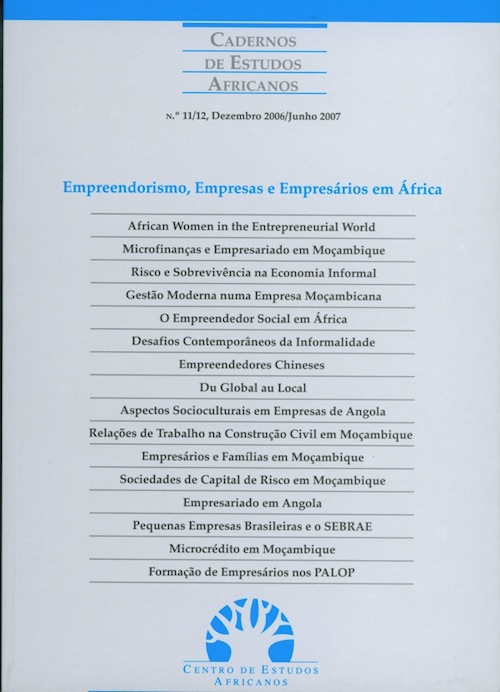Os Empreendedores Chineses e o Processo de Transformação Económica na China
DOI:
https://doi.org/10.4000/cea.941Palavras-chave:
Empreendedorismo, Sector privado, Desenvolvimento económico, República Popular da ChinaResumo
Ao historiar as reformas levadas a cabo pelo Partido Comunista Chinês (PCC) e o processo de empreendorismo na República Popular da China (RPC), procurar‑se‑á mostrar as interacções entre o enquadramento institucional e a iniciativa privada, considerando que, na China, as instituições que regulam o funcionamento da sociedade não são, na sua génese, regulamentações legais ou convenções culturais, mas directivas emanadas do PCC. São estas também que contêm o essencial respeitante à regulamentação das actividades empresariais. Para tal, serão primeiro identificadas as características específicas da envolvente institucional chinesa para, depois, se situar a condição da iniciativa privada em termos históricos e se investigarem as interacções dos empresários com essa envolvente institucional.
Referências
Burt, R. S. (1992), Structural Holes: The Social Structure of Competition, Cambridge, Harvard University Press.
Cheung, Peter T.Y., Jae Ho Chung, e Zhimin Lin (1998), Provincial Strategies of Economic Reform in Post‑Mao China: Leadership, politics and implementation, Nova Iorque, M. E. Sharpe.
China Statistical Yearbook (1993), Beijing, State Statistical Bureau of PRC.
China Statistical Yearbook (2001), Beijing, National Bureau of Statistics of China. Fan Gang, 1998, «Is the transition under control? Gradualism and macroeconomic policy», Michel Fouquin e Françoise Lemoine (eds.), The Chinese Economy, Londres, Economica.
Gardner, John (1982), Chinese Politics and the Succession to Mao, Nova Iorque, Holmes & Meier.
Gregory, N., Tenev, S., e Wagle, D. (2000), «China’s emerging private enterprises: prospects for the new century», Washington, D.C., International Finance Corporation.
Gregory, P. R., e Stuart, R. C. (1992), Soviet Economic Structure and Performance, Boston, Houghton Miflin Company.
Huang, Ray (1990), China: a Macrohistory, Nova Iorque, M. E. Sharpe. Kissinger, Henry (1994), Diplomacy, Nova Iorque, Touchstone.
Kraus, Willy (1991), Private Business in China: Revival between Ideology and Pragmatism, Honolulu, University of Hawaii Press.
Laaksonen, Oiva (1988), «Management in China during and aTer Mao», Berlim, Walter de Gruyter & Co.
Liu Hua Wei (2000), Legal Guide to Foreign Investment in China, Foreign Investment Counsel Series, Chinese Economics Publishing House.
Ma Jisen (1988), «A General Survey of the Resurgence of the Private Sector of China’s Economy», Social Sciences in China, Autumn, pp. 78‑92.
Mao Tsetung (1975), Obras Escolhidas de Mao Tsetung, Tomo IV, Pequim, Edições em Línguas Estrangeiras.
Naughton, Barry (1994), Growing out of the Plan: Chinese Economic Reform, 1978‑1993, Nova Iorque, Cambridge University Press.
Studwell, Joe (2002), The China Dream: The Elusive Quest for the Greatest Untapped Market on Earth, Londres, Profile Books.
Trigo, Virgínia (1995), The Upsurge of Private Entrepreneurship in China, Hüvl Editions.
Wong, Christine P. W. (1996), «People’s Republic of China», Pradumna B. Rana e Naved Amid (eds.) From Centrally Planned to Market Economies: The Asian Approach, vol. 2, Oxford, Oxford University Press, pp. 3‑275.
Young, Susan (1995), Private Business and Economic Reform in China, Nova Iorque, M. E. Sharpe.
Downloads
Publicado
Edição
Secção
Licença
Direitos de Autor (c) 2016 Cadernos de Estudos Africanos

Este trabalho encontra-se publicado com a Licença Internacional Creative Commons Atribuição-NãoComercial-CompartilhaIgual 4.0.
Autorizo a publicação do artigo/recensão submetido do qual sou autor.
Declaro ainda que o presente artigo é original, que não foi objecto de qualquer tipo de publicação, e cedo em exclusivo os direitos de publicação à revista Cadernos de Estudos Africanos. A reprodução do artigo, no todo ou em parte, noutras publicações ou noutros suportes depende de autorização prévia da editora Centro de Estudos Internacionais do Iscte - Instituto Universitário de Lisboa.

